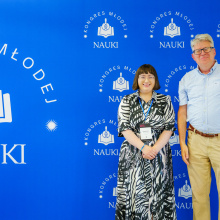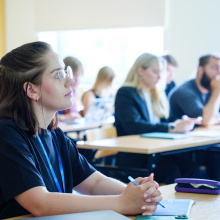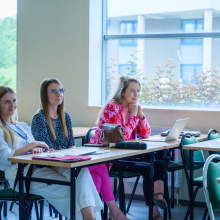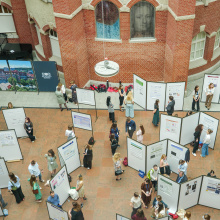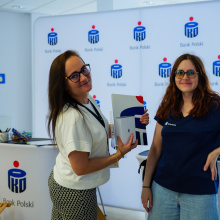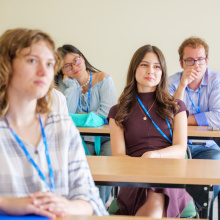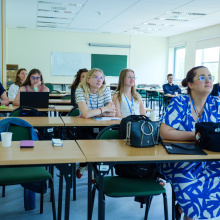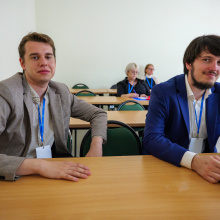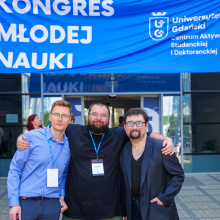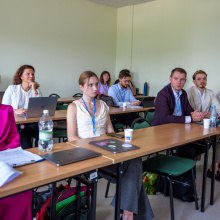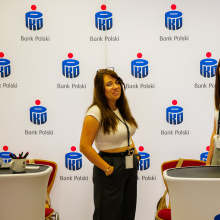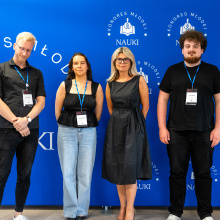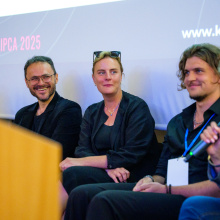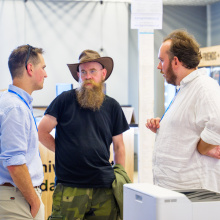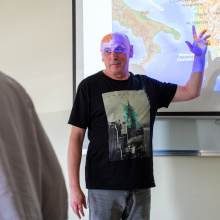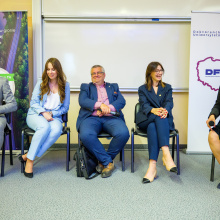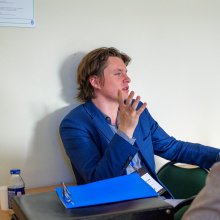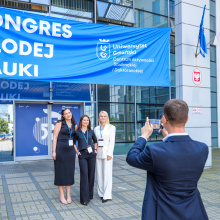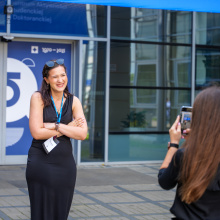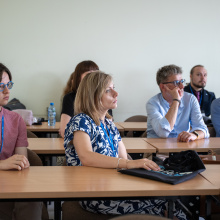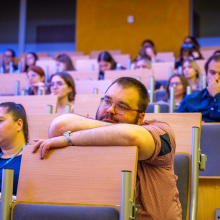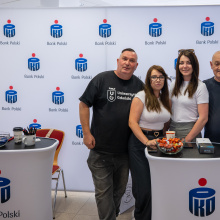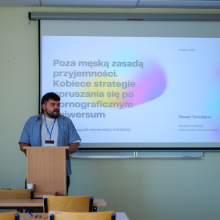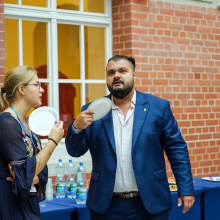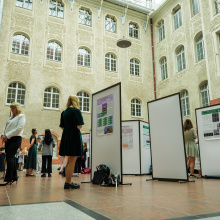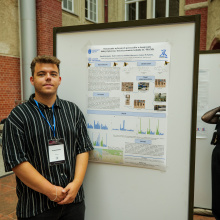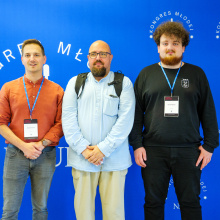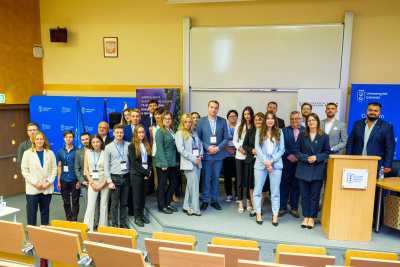
fot. Łukasz Bień
Nearly 700 participants from 120 research centres in Poland and abroad, 93 scientific panels, energy and joy of science. The 5th Young Science Congress, which took place on July 17-19, 2025, is behind us. ‘I don't know if science can be young, old or middle-aged. Science is simply wonderful, magnificent. Let's love science, let's love what we do,’ said prof. Piotr Stepnowski, Rector of the University of Gdańsk, during the official opening of the Congress.
The Young Science Congress is a regular international and multidisciplinary scientific conference held at the University of Gdańsk. From 2024, the Congress has also been organised by the Gdańsk University of Technology and the Medical University of Gdańsk.
As part of the event, young scientists presented the results of their research in 93 panels ranging from the exact sciences to the humanities, discussed their theses, established contacts and developed scientifically.
‘ The Young Science Congress is one of the largest events of its kind in Poland, and certainly the most important, because its strength lies in its interdisciplinary nature. So many areas of science, fields, disciplines and specialisations come together here,’ said prof. dr hab. Piotr Stepnowski, Rector of the University of Gdańsk and Chairman of the Scientific Committee of the Young Science Congress, during the opening of the 5th Young Science Congress. ‘Take advantage of this opportunity to inspire each other, observe various research workshops, always aiming to investigate and discover something really interesting, new and innovative, because that is the beauty of science. I don't know if science can be young, old or middle-aged. Science is simply wonderful, magnificent. Let's love science, let's love what we do. Let's not lose our enthusiasm and optimism, because only in this way will we be able to build our pool of young scientists, which will testify to the strength of Polish science.’
Dr. hab. Urszula Patocka-Sigłowy, prof. UG, Vice-Rector for Student Affairs at the University of Gdańsk, mentioned the emotions she felt on the opening day of the event and did not hide her pride that once again so many young scientists had expressed their willingness to participate in the conference. ‘A few weeks ago, I joked with the organisers that it would be great if at least 555 participants came to the fifth congress, on the 55th anniversary of the University of Gdańsk, and I kept my fingers crossed that it would happen. You are proof that it was possible to invite 555 people, and even more, to Gdańsk,’ she said from the stage.
After the official part, a lecture on secure banking was given by Paulina Krakowska, an expert from the Cyber Security Department at PKO Bank Polski, which sponsored the event. This was followed by a plenary panel discussion entitled ‘Not just science: mental well-being and burnout in academia’, attended by representatives of the University of Gdańsk:dr hab. Urszula Patocka-Sigłowy, prof. UG, dr hab. Anna Dziadkiewicz (Vice-Dean for Internationalisation and Development of the Faculty of Management, University of Gdańsk), dr Agata Rudnik (psychologist, director of the Academic Psychological Support Centre), dr hab. Paweł Atroszko, prof. UG (Department of Psychometrics and Statistics) and mgr Jurand Sobiecki (psychologist and medical biologist, assistant at the Department of Neuropsychology).
During the meeting, the participants discussed, among other things, the impact of study and work conditions on the mental health of people associated with academia, and how higher education institutions can support the well-being of their communities.
Exchange of ideas in a friendly environment
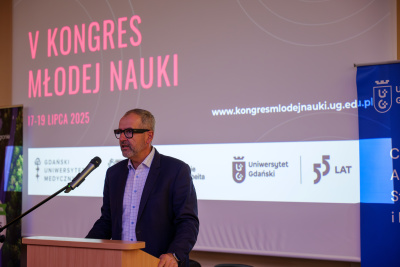
‘The direct inspiration for establishing the Young Science Congress was the need to create a space where young scientists could present their research results to a wider audience. Participation in scientific conferences involves high costs, which often constitute a significant barrier, especially for people at the beginning of their academic careers. Therefore, it was crucial to create an accessible and friendly event that would enable not only the exchange of ideas, but also constructive, substantive criticism in a supportive environment,’ explains Łukasz Bień, Coordinator of the Congress Organising Committee.
The first edition of the Congress was held at the Faculty of Law and Administration and focused mainly on social sciences and humanities. After the event was positively received by the authorities of the University of Gdańsk, the academic community and participants, it was decided to expand the thematic scope to include exact, technical and medical sciences. Since its second edition, the Congress has been held at the Faculty of Social Sciences and organised by the Centre for Student and Doctoral Activities.
The conference programme is created by the participants
The morning of July 18 marked the beginning of an intense day full of diverse topics: from contemporary communication challenges to neurodevelopmental disorders and the place of humans in the digital world. Science enthusiasts could choose from as many as 93 scientific panels in the fields of exact, experimental, humanities, social and other sciences.
The organisers are delighted that the event is gaining momentum. ‘Every year, more and more participants register for the conference. The second congress was attended by about 150 participants, the third by about 200, the fourth by about 400, and this year by as many as 700 from about 120 scientific institutions in Poland and around the world,’ says Piotr Patalas, Congress Office Manager.
What is the secret of the event's success? ‘One of the foundations of the Congress is its interdisciplinary nature. In the face of growing scientific specialisation, the value of exchanging inspiration between representatives of different fields has been recognised. Although it might seem that, for example, a theatre scholar and an organic chemist would not find a common language, the interest in the Congress and its effects, including joint research, grants and publications, have proven that such meetings are extremely valuable,’ explains Łukasz Bień.
Piotr Patalas adds: ‘Our conference is unique because the programme is created by its participants. We enable young scientists to submit their proposals for thematic panels, such as green consumer behaviour or the affective dimensions of politics. Whether a proposal is included in the conference programme depends on how attractive its description is and how many participants register for the panel.’
Not just an academic event
The panels that attracted the most interest this year were the political science and education panels. The former was attended by, among others, dr Vladimír Hanáček from the University of South Bohemia in České Budějovice, who gave a presentation on pre-election coalitions, a new phenomenon in the Polish and Czech party systems from a comparative perspective. ‘I heard about the congress a year ago from a friend of mine from Wrocław, who recommended the event to me. This year, I submitted my abstract, it was accepted, and I had the pleasure of delivering my paper. I am glad I came to the congress because the atmosphere here is great,’ said the political scientist.
The moderator of the political science panel, dr Dominik Bień, highly rated the level of the presentations.
‘We had very good panellists, ranging from students to PhD students, PhDs and even habilitated doctors. The substantive level and the level of discussion were very high. What is encouraging is that the people who presented their research were open to discussion with others,’ says the researcher from the Faculty of Social Sciences at the University of Gdańsk.
Adrianna Mojsa, a third-year student of creative writing at the University of Gdańsk, took part in the Young Science Congress for the second time. In the panel ‘Gender and Literature,’ she spoke about ‘The image of women writers in the diaries of Lucy Maud Montgomery and Anna Iwaszkiewicz.’ ‘I felt like I was in a literature laboratory,’ says the student, who makes no secret of the fact that she sees her future in academic work. She adds: ‘The Congress is not only an academic event, but also a social and community event. I meet both undergraduate and master's students here. You don't have to be working on a PhD or finishing your master's thesis to give a lecture here. It's a really interesting and valuable experience. I think that the academic path is not only about learning, but also about meeting new people and exchanging ideas, and that's wonderful.’
Julia Szyszka (Adam Mickiewicz University in Poznań) came from Poznań and gave a presentation in the same panel on Gabriela Zapolska's approach to the issue of sex work in her novel ‘O czym się nie mówi’ (‘What Is Not Said’) against the backdrop of the realities of the era. ‘This is the first time I have experienced such a pleasant atmosphere at a conference. The panel moderators are very knowledgeable and supportive at the same time. That's what charmed me in Gdańsk,’ said a Polish philology student.
In addition to the thematic panels, a discussion panel on obtaining funding for doctoral students' activities was held on 18 July. Thanks to the fact that the Congress is supported by industry committees associated with young scientists, the following people took part in it: Anna Nieczaj, Chairwoman of the National Representation of Doctoral Students, Kamil Kucharski from the Council of Young Scientists and Aleksandra Wendorf, Vice-Chairwoman of the West Pomeranian Doctoral Students' Agreement. Dr hab. Zbigniew Bukowski, prof. UKW, Vice-Rector for Finance and Organisation at Kazimierz Wielki University, shared his experience with the participants. The panel was moderated by Joanna Paprzycka, Chairwoman of the Doctoral Forum of Polish Universities.
‘The huge success of the Congress was possible not only thanks to the wonderful team, which I had the pleasure of coordinating, but also thanks to the support of the authorities of the four universities organising the Congress,’ emphasises Łukasz Bień.
The expansion of the group of organisers made it possible to organise a poster session in the picturesque courtyard of the Gdańsk University of Technology in 2024. And so it was this year. On Saturday, 19 July, young scientists presented their posters within the dignified walls of the GUT.
Caring for the climate and the planet
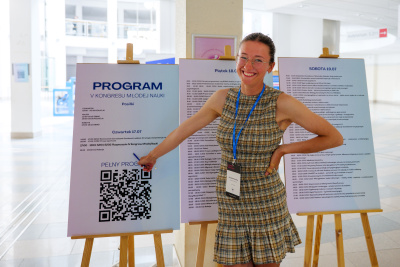
fot. Łukasz Bień
It is worth mentioning that for the second year in a row, the Congress organisers are offering a vegan, plant-based menu. ‘We proposed it because issues such as climate protection and reducing our carbon footprint are important to us,’ explains Piotr Patalas. ‘A conference for 700 people is a very large undertaking, which is why we decided, for example, not to print programmes, but to refer to large boards displaying the conference agenda. The scale of the undertaking is so large that even a small change, such as a vegan menu or not printing programmes, can benefit us all. We want to show that events such as scientific conferences can change our reality,’ emphasises the Head of the Congress Office.
The organisers would like to thank the following UG units for their involvement in the organisation of the event: UG Archives, Centre for Sustainable Development and UG Library. The 5th Young Science Congress was sponsored by PKO BP.


